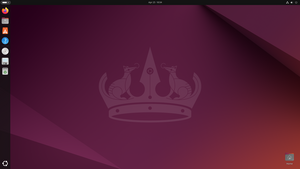 | |
 Ubuntu 24.04 "Noble Numbat" | |
| Developer | Canonical Ltd. |
|---|---|
| OS family | Linux (Unix-like) |
| Working state | Current |
| Source model | Open-source[1][2] |
| Initial release | Ubuntu 4.10 (Warty Warthog) / 20 October 2004 |
| Latest release | LTS: 24.04.1 LTS[3] |
| Latest preview | Ubuntu 24.10 Beta (Oracular Oriole) / 19 September 2024 |
| Repository | |
| Marketing target | Cloud computing, personal computers, servers, supercomputers, IoT |
| Available in | More than 55 languages by LoCos |
| Update method | Software Updater, Ubuntu Software, apt |
| Package manager | GNOME Software, dpkg (APT), Snap – graphical front-end: Snap Store |
| Platforms | |
| Kernel type | Monolithic (Linux kernel) |
| Userland | GNU |
| Default user interface | GNOME |
| License | Free software + some proprietary device drivers,[6] excluding trademarks |
| Official website | ubuntu |
Ubuntu (/ʊˈbʊntuː/ uu-BUUN-too)[7] is a Linux distribution derived from Debian and composed mostly of free and open-source software.[8][9][10] Ubuntu is officially released in multiple editions: Desktop,[11] Server,[12] and Core[13] for Internet of things devices[14] and robots.[15][16] The operating system is developed by the British company Canonical[17] and a community of other developers, under a meritocratic governance model.[7][18] As of April 2024[update], the most-recent long-term support release is 24.04 ("Noble Numbat").
As with other Linux distributions, all of the editions can run on a computer alone, or in a virtual machine. An upgrade to Ubuntu is released every six months, with long-term support (LTS) releases every two years.[7][19][20] Canonical provides security updates and support for each Ubuntu release, starting from the release date until the release reaches its designated end-of-life (EOL) date.[7][21][22] Canonical generates revenue through the sale of premium services related to the Ubuntu software and donations from those who download Ubuntu directly.[23][24][25]
Ubuntu is named after the Nguni philosophy of ubuntu, "humanity to others" with a connotation of "I am what I am because of who we all are".[7] Since the release of the first version in 2004, Ubuntu has become one of the most popular Linux distributions for general purposes[26][27] and is backed by large online communities like Ask Ubuntu. Numerous community-editions of Ubuntu also exist.[28] It is also popular for cloud computing, with support for OpenStack.[29]

- ^ "kernel.ubuntu.com". kernel.ubuntu.com. Archived from the original on 21 August 2018. Retrieved 20 April 2018.
- ^ "Index of /ubuntu". archive.ubuntu.com. Archived from the original on 11 May 2020. Retrieved 20 April 2018.
- ^ "Ubuntu 24.04.1 LTS released". 29 August 2024. Retrieved 30 August 2024.
- ^ "Installation". Ubuntu Server Documentation. Canonical Ltd. 2020. Archived from the original on 29 November 2021. Retrieved 1 January 2022.
Ubuntu 20.04 Server Edition [...] supports four 64-bit architectures: amd64, arm64, ppc64el, s390x
- ^ "Supported platforms". Ubuntu Core Documentation. Canonical Ltd. 2020. Archived from the original on 1 January 2022. Retrieved 1 January 2022.
- ^ "Explaining Why We Don't Endorse Other Systems". Free Software Foundation. Archived from the original on 24 April 2011. Retrieved 14 July 2015.
- ^ a b c d e Canonical. "About the Ubuntu project". Ubuntu.com. Archived from the original on 28 April 2018. Retrieved 1 May 2018.
- ^ Canonical. "Licensing". ubuntu.com. Archived from the original on 2 May 2018. Retrieved 1 May 2018.
- ^ Canonical. "Our mission". ubuntu.com. Archived from the original on 2 May 2018. Retrieved 1 May 2018.
- ^ Canonical. "Debian". ubuntu.com. Archived from the original on 2 May 2018. Retrieved 1 May 2018.
- ^ Canonical. "Ubuntu PC operating system". Ubuntu.com. Archived from the original on 16 September 2015. Retrieved 1 May 2018.
- ^ Canonical. "Ubuntu Server - for scale out workloads". Ubuntu.com. Archived from the original on 23 December 2018. Retrieved 1 May 2018.
- ^ Canonical. "Ubuntu Core". Ubuntu.com. Archived from the original on 28 April 2018. Retrieved 1 May 2018.
- ^ Canonical. "Ubuntu for the Internet of Things". Ubuntu.com. Archived from the original on 28 April 2018. Retrieved 1 May 2018.
- ^ "Your first robot: A beginner's guide to ROS and Ubuntu Core [1/5]". blog.ubuntu.com. Archived from the original on 16 August 2018. Retrieved 16 August 2018.
- ^ Trenholm, Richard. "Open source Ubuntu Core connects robots, drones and smart homes". CNET. Archived from the original on 16 August 2018. Retrieved 16 August 2018.
- ^ Canonical. "Canonical and Ubuntu". ubuntu.com. Archived from the original on 2 May 2018. Retrieved 1 May 2018.
- ^ Canonical. "Governance". Ubuntu.com. Archived from the original on 30 April 2018. Retrieved 1 May 2018.
- ^ "Releases - Ubuntu Wiki". wiki.ubuntu.com. Archived from the original on 29 October 2013. Retrieved 1 May 2018.
- ^ "LTS - Ubuntu Wiki". wiki.ubuntu.com. Archived from the original on 5 August 2011. Retrieved 1 May 2018.
- ^ "Releases - Ubuntu Wiki". wiki.ubuntu.com. Archived from the original on 29 October 2013. Retrieved 1 May 2018.
- ^ Canonical. "Release end of life". ubuntu.com. Archived from the original on 20 March 2018. Retrieved 1 May 2018.
- ^ Canonical. "Support and management". ubuntu.com. Archived from the original on 28 April 2018. Retrieved 1 May 2018.
- ^ Canonical. "Plans and pricing". Ubuntu.com. Archived from the original on 28 April 2018. Retrieved 1 May 2018.
- ^ Canonical. "Thank you for your contribution". Ubuntu.com. Archived from the original on 17 August 2021. Retrieved 25 August 2021.
- ^ "Ubuntu Pulls Its Latest Desktop Release Over Hate Speech Concerns". PCMag Middle East. 15 October 2023. Retrieved 24 November 2023.
- ^ "Top Five Reasons Why Ubuntu Is the Most Used Linux OS". 7 September 2015.
- ^ Evangelho, Jason. "Linux For Beginners: Understanding The Many Versions Of Ubuntu". Forbes. Retrieved 24 November 2023.
- ^ Canonical. "OpenStack on Ubuntu is your scalable private cloud, by Canonical". ubuntu.com. Archived from the original on 28 April 2018. Retrieved 1 May 2018.